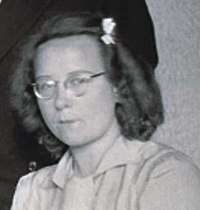Bep Voskuijl
| Elizabeth Voskuijl | |
|---|---|
 Bep Voskuijl in 1945 | |
| Born |
5 July 1919 Amsterdam, Netherlands |
| Died |
6 May 1983 (aged 63) Amsterdam, Netherlands |
| Nationality | Dutch |
| Other names | Bep Vuskuil, Elli Vossen |
| Occupation | Secretary of Opekta |
| Spouse(s) | Cornelius van Wijk (m. 1946) |
| Children | 4 |
Elizabeth "Bep" Voskuijl (Dutch pronunciation: [eːlisabɛt bɛp ˈfɔskœyl])[1] (Elli Vossen) (5 July 1919 – 6 May 1983) helped conceal Anne Frank and her family from Nazi persecution during the occupation of the Netherlands.
Biography
Bep was born in Amsterdam. She was one of the eight children of Johannes and Christina Voskuijl. When still a teenager, Bep worked as a modiste, waitress and housekeeper in order to earn money for tuition and graduated as a secretary.
She was hired by Otto Frank in 1937 as a secretary and by 1942 was the administration manager of his company, Opekta, based at 263 Prinsengracht, the address which would become the Frank family's hiding place. She was eighteen when she started working and was the youngest employee in the office. She had good relations with Miep Gies. Later, her unemployed father (he had health problems), Johannes Hendrik Voskuijl, became Opekta warehouse supervisor. In her book, "Anne Frank Remembered", Miep Gies portraits Bep as a gentle and very shy girl and recalls they soon became close friends. Elisabeth was a young typist who agreed to help bring provisions to Otto's family and four other people concealed in the back rooms of the office building, from July 1942, until their betrayal and arrest on 4 August 1944. Bep was responsible for milk and bread, and Bep's sister sewed garments such as pants and blouses for the people in hiding. She also ordered correspondence courses, such as shorthand and Latin for those in hiding and spent much time with Anne, speaking about movies, dresses and books and sharing confidences about her sweetheart, and bringing her postcards of the Dutch royal family. During the Gestapo raid, she went into hysterics and managed to escape with a few documents which would have incriminated their black market contacts, but returned to assist Miep Gies in collecting the personal possessions of the captured Jews, amongst which were Anne Frank's diaries and manuscripts.
She left the company after her marriage to Cornelius van Wijk on 15 May 1946 and they went on to have four children: Ton, Cor, Joop, and a daughter, Anne-Marie, born in 1960, who was named after Anne.
After World War II
She was honoured in later years for her activities during the Second World War, but disliked publicity and gave few interviews about her association with Anne Frank. Still, they were "like sisters with Anne". Bep kept in contact with Otto Frank even after his move to Switzerland (after his retirement in 1952) and new marriage. Otto knew that Bep had troubles making ends meet and did his best to help her, too. He occasionally lent money to her. Bep Voskuijl – van Wijk died in Amsterdam on 6 May 1983, due to a kidney disease. She was 63 years old.
See also
References and further reading
- Anne Frank (2003). David Barnouw; Gerrold Van der Stroom, eds. The Diary of Anne Frank: The Revised Critical Edition. Translated by Arnold J. Pomerans. Compiled by H. J. J. Hardy. (second ed.). Doubleday.
- Miep Gies; Alison Leslie Gold (1988). Anne Frank Remembered. Simon and Schuster.
- Carol Ann Lee (1999). Roses from the Earth: the Biography of Anne Frank. Penguin.
- Melissa Muller (1999). Anne Frank: the Biography. Foreword by Miep Gies. Bloomsbury.
- Carol Ann Lee (2002). The Hidden Life of Otto Frank. Penguin.
References
- ↑ In isolation, Voskuijl is pronounced [ˈvɔskœyl].